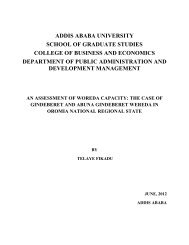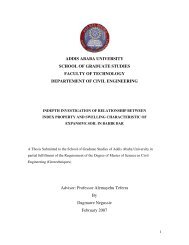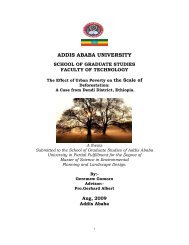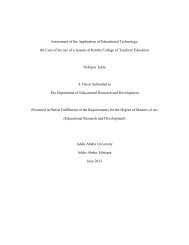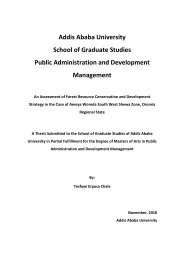FACTORS THAT CONTRIBUTE TO THE PROBLEMS EFL ...
FACTORS THAT CONTRIBUTE TO THE PROBLEMS EFL ...
FACTORS THAT CONTRIBUTE TO THE PROBLEMS EFL ...
You also want an ePaper? Increase the reach of your titles
YUMPU automatically turns print PDFs into web optimized ePapers that Google loves.
As indicated in chapter one, before this study was started, there was an<br />
assumption that (1) Ethiopian students learn <strong>EFL</strong> listening at the lower classes and<br />
(2) college students are experienced with <strong>EFL</strong> listening activities. From the data<br />
obtained through the questionnaire, however, many of the subjects reported their<br />
experiences which seem to sharply contradict with the above assumptions. Thus,<br />
cross-checking questions were asked to cross-examine the reliability of the data<br />
obtained from the questionnaire.<br />
Q1: Before you joined the university, what experiences did you have in gaining<br />
listening skills?<br />
• Did you get opportunities to practice listening skills? If that was so, in what<br />
way?<br />
- What kind of listening activities did you practice?<br />
- Were you exposed to the native speaker English?<br />
Most of the interviewees reported that they have deep-rooted difficulties of <strong>EFL</strong><br />
listening for the reason that they didn’t practice it at lower classes. Different<br />
students gave different reasons for this case. One learner (S1) reported that she<br />
didn’t practice <strong>EFL</strong> listening while she was in high school. This was because her<br />
English teacher always skipped over the listening lessons of the textbook “My<br />
English teacher used to skip over the listening lesson whenever he got to the<br />
lesson.” The other learner’s (S2) blame his poor listening performance on his rural<br />
background and on lack of access to resources of the <strong>EFL</strong> listening, “I came from<br />
rural area where there was no DS-TV or video that can help me to practice the <strong>EFL</strong><br />
listening.”<br />
The researcher got some students who went through <strong>EFL</strong> listening practices<br />
while they were at high schools. The <strong>EFL</strong> listening experiences of these students<br />
was, however, based on the teachers’ ‘reading aloud’. Therefore, they have not<br />
been exposed to the native speaker English. The reason they presented for this<br />
case is that they did not get opportunity to be acquainted with the speech of the<br />
native speakers. This can be one factor which makes the students unfamiliar with<br />
the natural feature of spoken English.<br />
55




